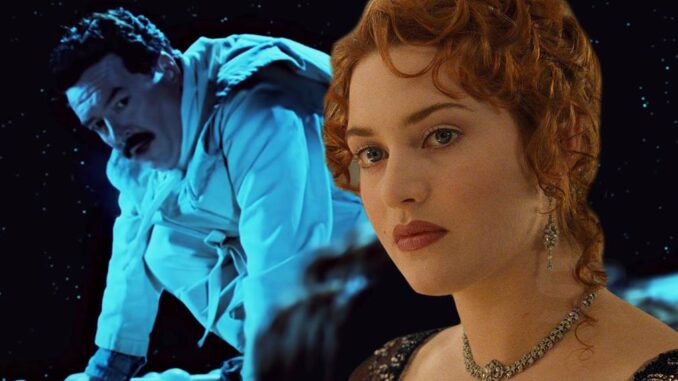
The Ghost on the Bow: A Bizarre Truth Behind a Titanic Tableau
The image is etched in our collective memory: Jack Dawson, arms outstretched, a young Rose DeWitt Bukater perched precariously on the bow of the Titanic, wind whipping through her hair. "I'm flying, Jack!" she cries, capturing a fleeting moment of youthful abandon against the backdrop of an opulent, yet doomed, vessel. But lurking in the margins of this iconic scene, a silent observer, stands a figure largely ignored by the romantic narrative. He is the unacknowledged third wheel, the spectral passenger with a story far stranger and more compelling than Jack and Rose's whirlwind romance: the bizarre truth behind the man Rose and Jack saw on the bow.
While James Cameron masterfully wove a fictional love story, the reality of the Titanic was crowded with characters, each carrying their own personal drama, hopes, and fears. It is this very density of humanity that makes the possibility of encountering someone truly peculiar on that voyage so plausible. Let us imagine, then, a man named Archibald Grimshaw, a passenger traveling in second class. He is not a dashing artist or a rebellious socialite; he is an amateur ornithologist, obsessed with the seabirds that follow ships across the vast ocean. Grimshaw is a man consumed by details, his notebooks filled with meticulous sketches and observations of their flight patterns, their calls, the subtle variations in their plumage.
On the fateful night, while Jack and Rose were caught in their forbidden embrace, Grimshaw was undoubtedly on deck, braving the biting wind, binoculars glued to his eyes. He wouldn't have noticed the couple; his world was focused upwards, on the magnificent albatrosses soaring above the ship, seemingly impervious to the impending tragedy. He might have muttered to himself, noting the specific tilt of a wing, the particular shade of grey on its breast, oblivious to the ice lurking beneath the waves.
This dedication to the avian world, this intense focus on the seemingly insignificant details, is where the bizarre truth of Grimshaw lies. He believed, with unwavering conviction, that these seabirds were more than just creatures of the sea; they were messengers from another realm, harbingers of fortune, or, in the Titanic's case, perhaps, omens of doom. He carried with him a collection of peculiar artifacts – feathers collected on previous voyages, bone fragments meticulously cleaned and cataloged, and a small, worn book containing cryptic interpretations of seabird behavior.
This obsession, viewed through the lens of a modern viewer, borders on the eccentric. Yet, within the context of the early 20th century, a time ripe with spiritualism and burgeoning scientific inquiry, Grimshaw's beliefs, while unusual, were not entirely out of step. Perhaps he saw patterns in the birds' flight that others dismissed as random. Perhaps he felt a connection to the natural world that transcended the confines of reason.
Imagine Rose, caught in the throes of her whirlwind romance, accidentally bumping into Grimshaw on the bow. She might have noticed his intense gaze, his strange collection of feathers, his whispered conversations with the wind. She might have dismissed him as a harmless eccentric, a quirky detail in the tapestry of the Titanic's passengers. Yet, the encounter would have left a faint, unsettling impression, a sense that something beyond her understanding was at play.
The true tragedy of Archibald Grimshaw is that his story, like the stories of countless other passengers, was swallowed by the icy depths of the Atlantic. His notebooks, his feathers, his bizarre beliefs – all lost, leaving behind only a faint echo, a ghost on the bow, a reminder of the human capacity for obsession, for belief in the unseen, and for the silent dramas that unfold alongside the grand narratives of history. He serves as a potent reminder that even in the most documented and dramatized events, there are countless hidden stories, strange and compelling, waiting to be discovered, reminding us that the truth, like the ocean itself, is often far deeper and more bizarre than we initially perceive. While Jack and Rose may have sailed into cinematic immortality, the enduring fascination with the Titanic compels us to look beyond the familiar romance and consider the untold tales of the Archibald Grimshaws, the silent observers, the keepers of the bizarre truths that haunt the edges of history.
